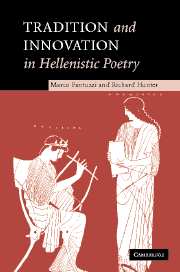Book contents
- Frontmatter
- Contents
- Preface
- List of abbreviations
- 1 Performance and genre
- 2 The aetiology of Callimachus' Aitia
- 3 The Argonautica of Apollonius and epic tradition
- 4 Theocritus and the bucolic genre
- 5 Epic in a minor key
- 6 The style of Hellenistic epic
- 7 The epigram
- 8 The languages of praise
- 9 Hellenistic drama
- 10 Roman epilogue
- Bibliography
- Index of passages discussed
- General index
7 - The epigram
Published online by Cambridge University Press: 22 September 2009
- Frontmatter
- Contents
- Preface
- List of abbreviations
- 1 Performance and genre
- 2 The aetiology of Callimachus' Aitia
- 3 The Argonautica of Apollonius and epic tradition
- 4 Theocritus and the bucolic genre
- 5 Epic in a minor key
- 6 The style of Hellenistic epic
- 7 The epigram
- 8 The languages of praise
- 9 Hellenistic drama
- 10 Roman epilogue
- Bibliography
- Index of passages discussed
- General index
Summary
INSCRIPTION AND EPIGRAM: THE ‘PREHISTORY’ OF A GENRE
In accordance with their common derivation, ἐπίγραμμα and ἐπιγραφή were originally almost synonymous: both referred to ‘engraved’ writing on a material which had not been specially constructed to receive writing, such as a waxed tablet, parchment or papyrus. Even as late as the early Hellenistic age, there is no indication that the idea of the epigram, as a specific genre of short poems usually in elegiac couplets, ever existed. Moreover, it is probably only from the end of the fourth century that we can trace a tradition of literary epigrams, that is to say poems not, or not necessarily, designed for public inscription; when it did appear, this new form took up the two main earlier traditions of short poetry, namely epitaphic or dedicatory inscriptions, usually in hexameters or, increasingly from the end of the sixth century, elegiac couplets, and shorter lyric poetry and erotic elegy (represented most notably by Mimnermus and the second book of the corpus of Theognis). At the heart of this new form was the quest for concentrated expression and the acuteness of a final pointe, rather than specific and generically determinative subject-matter; consequently we find, in our corpus of literary epigrams, sad epitaphs alongside both serious and parodically solemn dedications, and playfully erotic anecdotes alongside moral maxims, witticisms, and convivial banter.
- Type
- Chapter
- Information
- Tradition and Innovation in Hellenistic Poetry , pp. 283 - 349Publisher: Cambridge University PressPrint publication year: 2005



